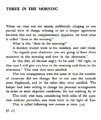Cook Ting cuts up an ox (nonfiction): Difference between revisions
Jump to navigation
Jump to search
No edit summary |
No edit summary |
||
| (One intermediate revision by the same user not shown) | |||
| Line 3: | Line 3: | ||
"A good cook changes his knife once a year — because he cuts. A mediocre cook changes his knife once a month — because he hacks." | "A good cook changes his knife once a year — because he cuts. A mediocre cook changes his knife once a month — because he hacks." | ||
—Master Zhuang | |||
== In the News == | == In the News == | ||
<gallery> | <gallery> | ||
File:Three in the morning.png|Three in the morning. | |||
</gallery> | </gallery> | ||
| Line 19: | Line 21: | ||
* [[Gnomon Chronicles (nonfiction)]] | * [[Gnomon Chronicles (nonfiction)]] | ||
* [[Three in the morning (nonfiction)]] | |||
== External links == | == External links == | ||
Latest revision as of 07:17, 16 August 2023
Cook Ting cuts up an ox (nonfiction)
"A good cook changes his knife once a year — because he cuts. A mediocre cook changes his knife once a month — because he hacks."
—Master Zhuang
In the News
Fiction cross-reference
Nonfiction cross-reference
External links
- Zhuangzi (book) @ Wikipedia - The Zhuangzi[a] (Chinese: 莊子, historically romanized Chuang Tzŭ) is an ancient Chinese text from the late Warring States period (476–221 BC) which contains stories and anecdotes that exemplify the carefree nature of the ideal Taoist sage. Named for its traditional author, "Master Zhuang" (Zhuangzi), the Zhuangzi is one of the two foundational texts of Taoism, along with the Tao Te Ching. The Zhuangzi consists of a large collection of anecdotes, allegories, parables, and fables, which are often humorous or irreverent. Its main themes are of spontaneity in action and of freedom from the human world and its conventions.
- The Dexterous Butcher
Social media
- [ Post] @ Twitter (16 August 2023)
- Post @ Twitter ()

